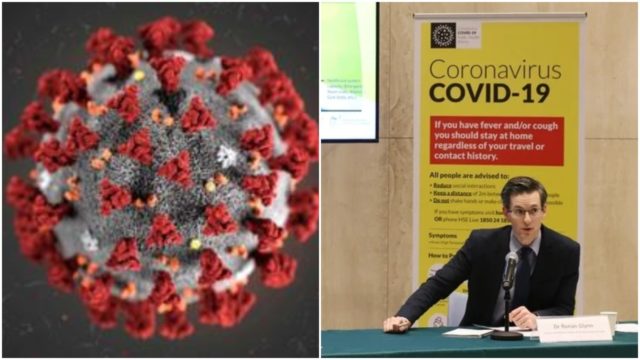There has one new Coronavirus deaths reported today – meaning 1,776 is the death toll in Ireland.
While there has been a total of 136 new cases of Coronavirus have been diagnosed in Ireland today.
51 are in Dublin, 24 in Kildare, 12 in Kilkenny, 11 in Tipperary, 7 in Cork, 6 in Limerick, 6 in Wexford, 5 in Meath and the remaining 14 cases are in Carlow, Cavan, Donegal, Galway, Mayo, Offaly, Roscommon, Waterford and Wicklow.
54 are men and 81 are women. 78% are under 45 years of age.
57 are confirmed to be associated with outbreaks or are close contacts of a confirmed casewhile 11 cases have been identified as community transmission.
1,311 cases have been reported in the last 14 days. 435 of these are in Kildare, 307 in Dublin, 81 in Offaly, 74 in Tipperary, 66 in Limerick and 41 in Laois.
The remaining cases are spread across 19 counties.
That means the total number of cases in the country is now 27,676.
Dr. Ronan Glynn, Acting Chief Medical Officer, Department of Health, said; “The core message from NPHET this week is to limit your social networks. Stick to a limit of 6 people from no more than 3 households indoors, and 15 people outdoors.
“Risk assess your environment and do not stay if it doesn’t feel safe. Remember that the virus wants large groups to gather together in order to spread. Do not give it the opportunity. We can continue to suppress this disease in Ireland by working together and staying apart.”
Professor Philip Nolan, Chair of the NPHET Irish Epidemiological Modelling Advisory Group, said; “The R-number is now at or above 1.2. There are two concerns now, the number of new cases per day remains high and the pattern has changed from large outbreaks in specific settings to much smaller outbreaks widely distributed across the country. The measures announced this week, asking us to stay apart, aim to suppress COVID-19 in the community.”
Dr Siobhán Ni Bhriain, Consultant Psychiatrist and Integrated Care Lead HSE, said; “Playing our part includes presenting for testing when required. This includes one initial test and a follow up test within seven days. By fulfilling this testing cycle you reduce the threat of asymptomatic transmission and help to control the spread of the disease.”
Today, the HSE has published results of the Study to Investigate COVID-19 Infection in People Living in Ireland (SCOPI): A national seroprevalence study, June-July 2020.
This study, the first of its type in Ireland, measured antibodies to SARS-CoV-2 virus, which are an indication of past infection with COVID-19. The study reports a prevalence of infection of 0.6% in Sligo and 3.1% in Dublin. Based on these results, HPSC estimates a national prevalence rate of 1.7%.
Dr Derval Igoe, Principal Investigator for SCOPI at the HPSC said: “It is not surprising that a relatively low national seroprevalence of 1.7% was observed here. Other countries in Europe, such as Spain and Italy, where there has been a much more intense epidemic, have reported national seroprevalence estimates of 5% and 2.5% respectively.
“This means that the vast majority of people living in Ireland had not been infected with SARS-CoV-2 virus by the time of the study. As a society, we need to continue with our public health measures, including physical distancing, respiratory etiquette, hand hygiene and the use of face coverings, until a vaccine for COVID-19 is available.”
Everyone should be aware of the risk factors for getting COVID-19:
- Distance – the risk of getting COVID-19 increases as the distance between you and others gets smaller. Keep 2 metres apart where possible
- Activity – How you spend time with people and what you do with them can increase your risk. Follow the government’s Stay Safe Guidelines when spending time with others
- Time – The more time you spend in close contact with other people can increase your risk of getting COVID-19. Keep track of who you spend time with and how
- Environment – Being outdoors is safer than being indoors. Where possible, meet with others outdoors. If this is not possible, keep windows and doors open when meeting others inside
- Symptoms – Know the symptoms. If you have them self-isolate and contact your GP immediately
Public Health Advice for all citizens available here:
Know the symptoms of COVID-19
- a fever (high temperature – 38 degrees Celsius or above)
- a cough – this can be any kind of cough, not just dry
- shortness of breath or breathing difficulties
- loss or change to your sense of smell or taste
- flu like symptoms






















